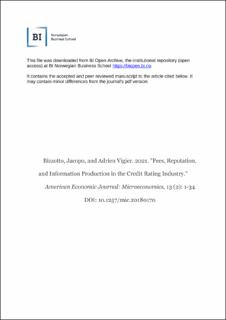| dc.contributor.author | Bizzotto, Jacopo | |
| dc.contributor.author | Vigier, Adrien Henri | |
| dc.date.accessioned | 2021-09-03T09:39:07Z | |
| dc.date.available | 2021-09-03T09:39:07Z | |
| dc.date.created | 2020-06-18T09:24:42Z | |
| dc.date.issued | 2020 | |
| dc.identifier.citation | American Economic Journal: Microeconomics, 13 (2): 1-34. | en_US |
| dc.identifier.issn | 1945-7669 | |
| dc.identifier.uri | https://hdl.handle.net/11250/2772802 | |
| dc.description.abstract | We compare a credit rating agency's incentives to acquire costly information when it is only paid for giving favorable ratings to the corresponding incentives when the agency is paid up-front, i.e., irrespective of the ratings assigned. We show that, in the presence of moral hazard, contingent fees provide stronger dynamic incentives to acquire information than up-front fees and may induce higher social welfare. When the fee structure is chosen by the agency, contingent fees arise as an equilibrium outcome, in line with the way the market for credit rating actually works. | en_US |
| dc.language.iso | eng | en_US |
| dc.publisher | American Economic Assosiation | en_US |
| dc.subject | Firm Behavior: Theory | en_US |
| dc.subject | Investment Banking | en_US |
| dc.subject | Credit Rating Agencies | en_US |
| dc.subject | Information Acquisition | en_US |
| dc.subject | Reputation | en_US |
| dc.title | Fees, Reputation and Information Production in the Credit Rating Industry | en_US |
| dc.type | Journal article | en_US |
| dc.type | Peer reviewed | en_US |
| dc.description.version | acceptedVersion | en_US |
| dc.source.pagenumber | 1-34 | en_US |
| dc.source.volume | 13 | en_US |
| dc.source.journal | American Economic Journal: Microeconomics | en_US |
| dc.source.issue | 2 | en_US |
| dc.identifier.doi | 10.1257/mic.20180170 | |
| dc.identifier.cristin | 1816062 | |
| cristin.ispublished | false | |
| cristin.fulltext | postprint | |
| cristin.qualitycode | 2 | |
